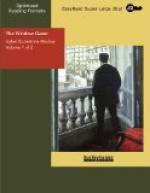And what was a young girl—a girl with level eyes and lifted chin— doing in this galley? . . . Undoubtedly the less he bothered himself about that question the better. This young person was probably just as she wished to appear, careless and content. And in any case it was none of his business.
The sensible thing for him to do was to pack his bag and turn his back—the absurd old man with the umbrella . . . pshaw! . . . He wouldn’t go home, of course. Aunt Caroline would say “I told you so” . . . no, she wouldn’t say it—she would look it, which was worse . . . he had come away for a rest cure and a rest cure he intended to have . . . with a groan he thought of the pictures he had formed of this place, the comfortable seclusion, the congenial old scholar, the capable secretary, the—he looked up to find that Miss Farr had returned and was regarding him with a cool and pleasantly aloof consideration.
“Are you wondering how soon you may decently leave?” she inquired. “We are not at all formal here. And, of course—” her shrug and gesture disposed of all other matters at issue. “Yours are the only feelings that need to be considered. I should like to know, though,” she continued with some warmth of interest, “if you really came just to observe Indians. Father might think of a variety of attractions. Health?—any-thing from gout to tuberculosis. Fish?—father can talk about fish until you actually see them leaping. Shooting?—according to father, all the animals of the ark abound in these mountains. Curios?—father has an Indian mound somewhere which he always keeps well stocked.”
Professor Spence smiled. “So many activities,” he said, “should bring better results.”
“They are too well known. Most people make some inquiry.” The faint emphasis on the “most” made the professor feel uncomfortable. Was it possible that this young girl considered him, Benis Spence, something of a fool? He dismissed the idea as unlikely.
“Inquiry in my case would have meant delay,” he answered frankly, “and I was in a hurry. I wanted to get away from—I wanted to get away for rest and study in a congenial environment. Still, I will admit that I might not have inquired in any case. I am accustomed to trust to my instinct. My father was a very far-sighted man—what are you laughing at?”
“Nothing. Only it sounded so much like ’nevertheless, my grandsire drew a long bow at the battle of Hastings’—don’t you remember, in ‘Ivanhoe?’”
The professor sighed. “I have forgotten ‘Ivanhoe,’” he said, “which means, I suppose, that I have forgotten youth. Sometimes its ghost walks, though. I think it was that which kept me so restless at home. I thought that if I could get away—You see, before the war, I was gathering material for a book on primitive psychology and when I came back I found some of the keenness gone.” He smiled grimly. “I came back inclined to think that all psychology is primitive. But I wanted to get to work again. I had never studied the West Coast Indians and your father’s letters led me to believe that—er—”




